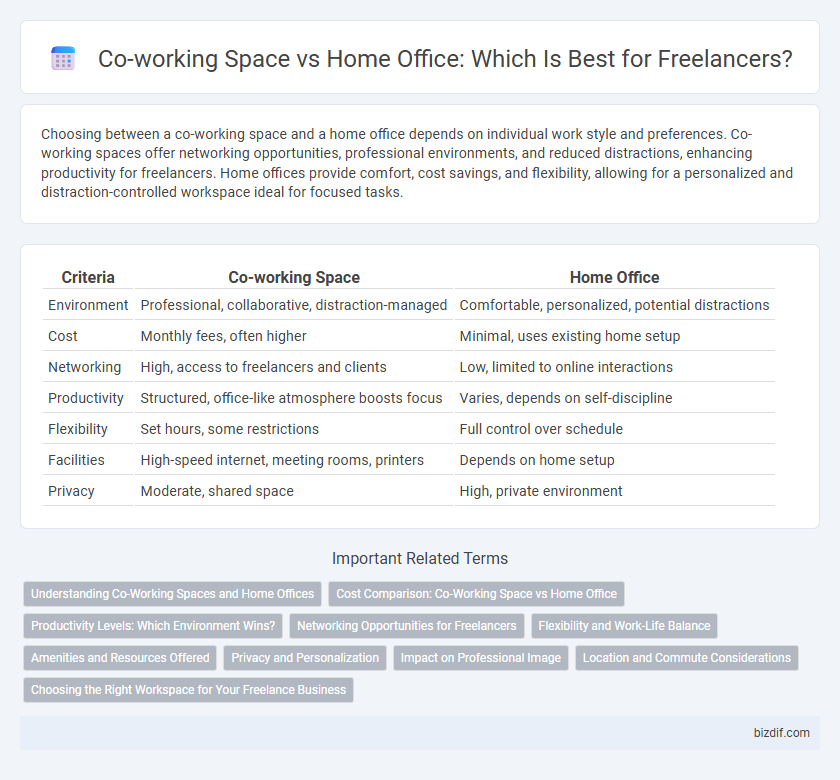Choosing between a co-working space and a home office depends on individual work style and preferences. Co-working spaces offer networking opportunities, professional environments, and reduced distractions, enhancing productivity for freelancers. Home offices provide comfort, cost savings, and flexibility, allowing for a personalized and distraction-controlled workspace ideal for focused tasks.
Table of Comparison
| Criteria | Co-working Space | Home Office |
|---|---|---|
| Environment | Professional, collaborative, distraction-managed | Comfortable, personalized, potential distractions |
| Cost | Monthly fees, often higher | Minimal, uses existing home setup |
| Networking | High, access to freelancers and clients | Low, limited to online interactions |
| Productivity | Structured, office-like atmosphere boosts focus | Varies, depends on self-discipline |
| Flexibility | Set hours, some restrictions | Full control over schedule |
| Facilities | High-speed internet, meeting rooms, printers | Depends on home setup |
| Privacy | Moderate, shared space | High, private environment |
Understanding Co-Working Spaces and Home Offices
Co-working spaces offer freelancers a dynamic environment with networking opportunities, professional amenities, and separation from home distractions, enhancing productivity and collaboration. Home offices provide personalized comfort, cost savings, and flexible working hours but can pose challenges with isolation and maintaining work-life balance. Choosing between these options depends on individual work style, need for social interaction, and specific project requirements.
Cost Comparison: Co-Working Space vs Home Office
Co-working spaces typically involve monthly fees ranging from $200 to $600 depending on location and amenities, while setting up a home office entails upfront costs such as ergonomic furniture and technology investments, usually between $1,000 and $3,000. Ongoing expenses for a home office include utilities and maintenance, which may add $50 to $150 monthly, whereas co-working spaces cover utilities and internet within their membership fees. Freelancers must weigh the variable monthly costs and initial investments to determine which option offers better financial efficiency based on their work habits and space requirements.
Productivity Levels: Which Environment Wins?
Co-working spaces offer freelancers structured environments with fewer home distractions, leading to higher productivity levels through networking opportunities and access to professional resources. Home offices provide comfort and flexibility, but may suffer from interruptions and blurred work-life boundaries, impacting focus and efficiency. Studies show freelancers in co-working spaces report up to 30% increased productivity compared to those working from home.
Networking Opportunities for Freelancers
Co-working spaces offer freelancers dynamic networking opportunities by fostering daily interactions with diverse professionals, leading to potential collaborations and client referrals. Unlike home offices, co-working environments provide access to community events, workshops, and informal meetups that can enhance industry connections and skills. These structured networking benefits significantly boost freelancers' visibility and business growth compared to the isolation of working from home.
Flexibility and Work-Life Balance
Co-working spaces offer freelancers enhanced flexibility with structured environments that encourage networking and collaboration, essential for avoiding isolation and maintaining motivation. Home offices provide personalized control over work schedules and routines, supporting a tailored work-life balance by minimizing commute times. Selecting between these options depends on individual preferences for social interaction versus solitude and the need for adaptable work hours to optimize productivity and personal well-being.
Amenities and Resources Offered
Co-working spaces provide essential amenities such as high-speed internet, meeting rooms, printing facilities, and communal areas designed for networking and collaboration, which are often absent in a typical home office setup. These resources enhance productivity and professional growth by offering a structured environment with access to office equipment and peer support. In contrast, home offices may lack these comprehensive services but offer tailored comfort and fewer distractions, depending on individual preferences and workspace design.
Privacy and Personalization
Co-working spaces often offer limited privacy due to shared environments and open layouts, which can hinder confidential work or phone calls. Home offices provide greater control over personalization, allowing freelancers to create tailored setups that enhance productivity and comfort. Investing in soundproofing and ergonomic furniture at home maximizes privacy and supports long-term focus.
Impact on Professional Image
Choosing a co-working space over a home office significantly enhances a freelancer's professional image by providing a dedicated, distraction-free environment that clients perceive as more credible and committed. Co-working spaces often offer modern amenities and networking opportunities, reinforcing professionalism and reliability in the eyes of potential clients. In contrast, working from home can blur boundaries and may appear less formal, potentially impacting client trust and long-term business growth.
Location and Commute Considerations
Choosing a co-working space often provides freelancers with strategic locations near urban centers, reducing commute times and enhancing access to networking opportunities. Home offices eliminate daily travel entirely, offering more flexibility but potentially isolating professionals from collaborative environments. Prioritizing proximity to client hubs and minimizing commute stress significantly impacts productivity and work-life balance in freelancing.
Choosing the Right Workspace for Your Freelance Business
Choosing the right workspace for your freelance business significantly impacts productivity and work-life balance. Co-working spaces offer networking opportunities, structured environments, and access to office amenities, while home offices provide flexibility, cost savings, and personalized comforts. Evaluating your workflow, collaboration needs, and budget helps determine whether a co-working space or home office better supports your freelance success.
Co-working space vs Home office Infographic

 bizdif.com
bizdif.com